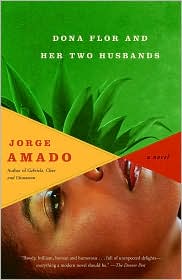Given my dislike for dramatic narratives—full of conspicuous coincidences, lengthy character analysis by an omniscient narrator, unholy surprises, and complex twists in the plot and subplots—it is quite astonishing that I’d end up praising “Dona Flor and Her Two Husbands” by the renowned Brazilian author Jorge Amado. But sometimes, miracles do really happen, and even the most hackneyed theme can be suffused with subtle magic to take you by pleasant surprise.

The novel is about the tumultuous conjugal life of Dona Flor, a girl from Bahia and unmatched in her culinary skills. After being brought up by a tyrannical stepmother (not that typified evil stepmother though), she chooses to marry Vadinho—a gambler and an impostor but at the same time, very lively and exuberant—paying no heed to the consternations of her well-wishers. Despite his gambling habits and nocturnal sojourns to whorehouses, Vadinho is very much in love with Flor, and devilishly passionate on bed. Flor meets all the expenses by running a cooking school.
The placid life of this couple comes to a sudden halt as Vadinho drops dead amidst all the festivities of a carnival day. It takes Dona Flor a long time to come in terms with her loneliness and the irreversible absence of Vadinho in her life, though her neighbours, and especially her stepmother, firmly maintains that nothing could be more beneficial for her than getting rid of that rogue. But Flor, unable to think of Vadinho in that simple black and white term, keeps on cherishing the memories of those loving moments with Vadinho. Her condition is further aggravated by the lonely nights, devoid of the bodily warmth of a man.
Lo, and behold! Another man enters Flor’s life precisely at this juncture—a pharmacist by the name of Teodoro. Teodoro is the exact opposite of Vadinho—respectable and extraordinarily dull. He fulfils all the duties of a faithful husband and loves Flor very much. Flor is indeed very happy with him, but at the same time, she misses those wild extravaganzas of Vadinho.
Suddenly, on the anniversary of Vadinho’s death, Vadinho’s ghost appears to Flor, willing to take her straight to bed. Flor is aghast with shame. As an upright woman, she can’t deceive Teodoro, her present husband, and on the other hand, it is almost impossible to escape Vadinho’s erotic charm (which Teodoro lacks).
Clearly, this is a story of moral dilemma—a conflict between body and soul—told from the perspective of a plain and simple woman. The plot is definitely banal, and lacking in originality (the only exception is, probably, the appearance of Vadinho’s apparition with its so-called magic realistic touch). In fact, the plot gets unnecessarily heavy and tedious with the somewhat forced inclusion of black magic and voodoo elements. But, what charms me most is Amado’s playful language and his subtly ironic tone. This pompous way of storytelling at once reduces the weight of its melodramatic content and even mocks at it. While reading the novel, you feel like being at a carnival, with all its eccentricity and hullabaloo, having a nonchalant air about you. This is probably what Bakhtin could have called “carnivalesque”.
Another triumph of Amado lies in his masterful characterisation. All the characters—Flor, Vadinho, Teodoro and even less important characters like Flor’s neighbourhood friends—have emerged with so much clarity that you feel like knowing them for ages, with their typical manners and eccentric behaviours. This technique sometimes runs the risk of making the characters too typified, but Amado, by and large, manages to handle it with care because, here, he intends his characters to be larger than life, so that it gives the novel a picaresque air.
Also, Amado maintains a strong erotic undercurrent throughout the text. It puts the reader at somewhat awkward position, namely, that of a voyeur. Along with the author, we also start to enjoy the lascivious details of Flor's beauty and relives those ecstatic moments with her.
Another interesting feature of the novel is its fleeting commentary, mostly satirical, on the socio-political state of Brazil, referring to the decadent lives of the upper class and the corruption in the administration. But, these deviations are not pursued very extensively. After finishing the book, city of Bahia seems to be almost bacchanalian—full of goons, gamblers and whores.
This brings us to another interesting possibility inherent in the novel. Can we interpret the fate of Dona Flor as the dilemma of a person caught midway between two different social classes—that of Vadinho, low and despicable, and that of Teodero, sober and respectable? But alas, the novel does not give us that much space for interpretation.
Also, before concluding, I must admit that I’m not very happy with the ending of the novel. It is too definitive and does not leave any space at all for reader’s imagination, or rather, it prohibits reader’s participation in the text. But, nonetheless, once you are through with the book, you still retain that bitter-sweet taste on your mouth, which is addictive, like a furtive kiss in a dark alley.



1 comment:
Hi,
I liked your blog. I thought that we could do a few cross blog things.
Would you be interested in reviewing my new book "Love, Peace and Happiness:What more can you want?"
I could do an author interview on yours. I could also post your review on my fanpage referenced below which has more than 10,000 fans giving you a whole new set of visitors.
Let me know if this makes sense for your blog.
Rituraj Verma, author
www.facebook.com/BookLPH
www.riturajverma.com/blog
email:riturajverma2005@gmail.com
Post a Comment